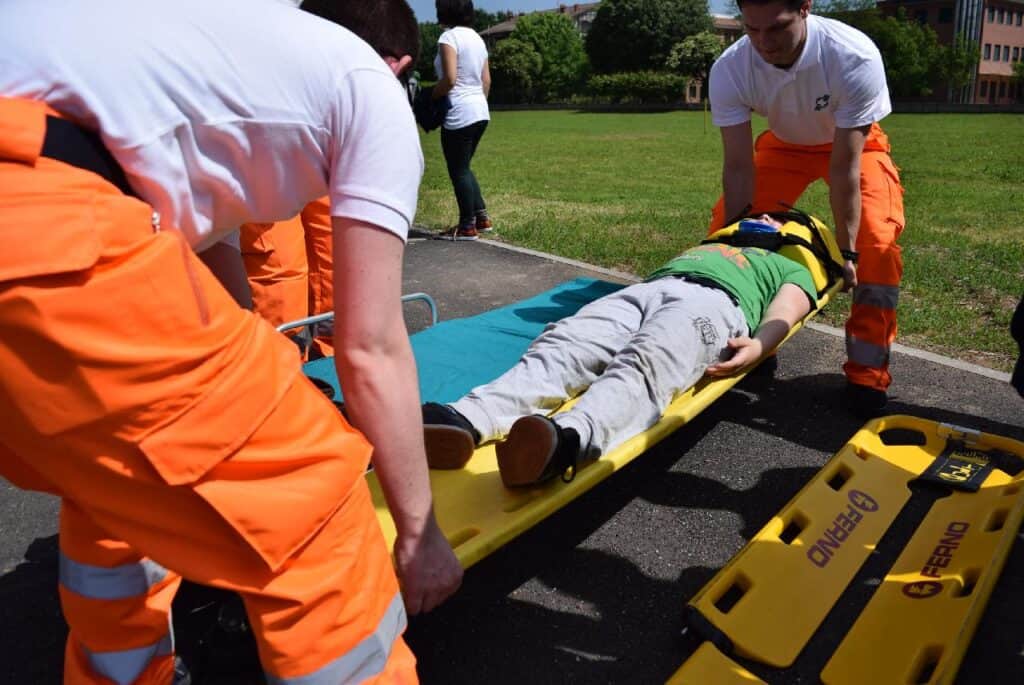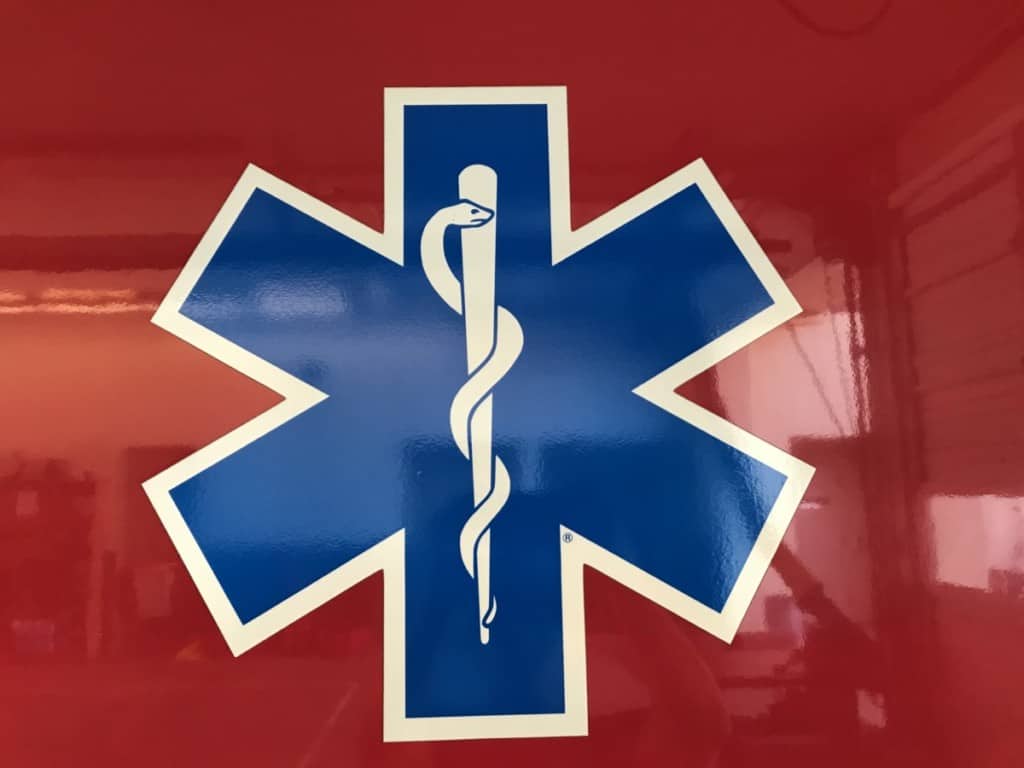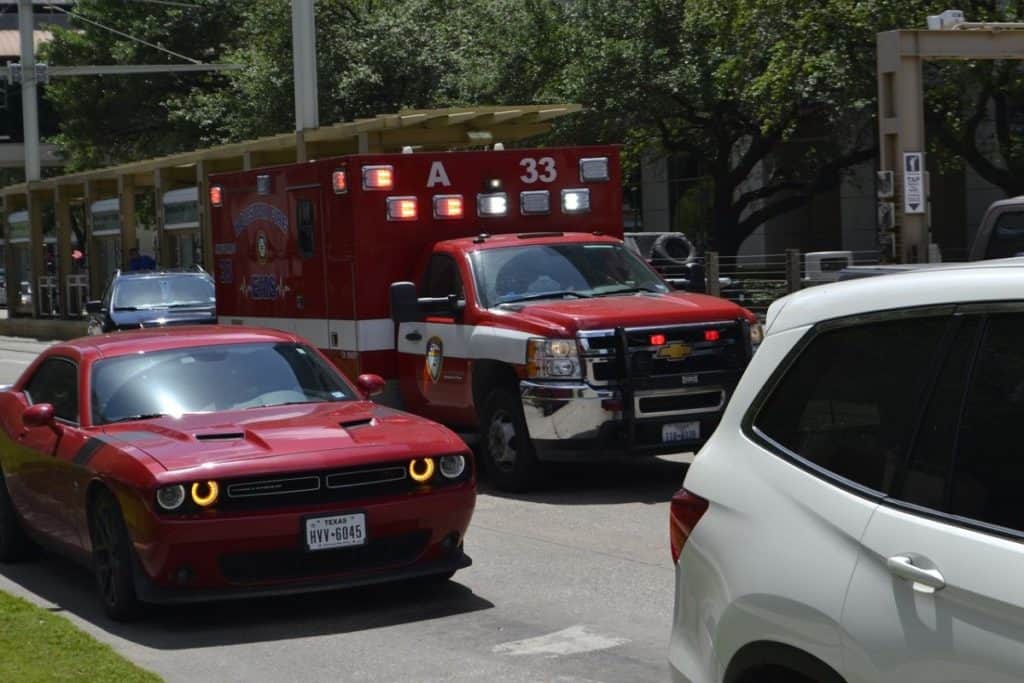In the United States, there are roughly 240 million 911 emergency calls per year. Of those calls, a significant portion are for medical assistance. The professionals that respond to those medical emergencies on ambulances and fire apparatus are EMTs and Paramedics and they are vital to the emergency medical system that cares for the sick an injured outside the hospital setting.
EMTs and Paramedics are important for the community and the population due to their specialty training and equipment. This enables them to respond quickly to medical emergencies where they can stabilize and treat urgent conditions and, if needed, transport the patients to the hospital.
But that is really just the basics of why these medical professionals are so important. Let’s take a look at some of the lesser-known details about what EMTs do and how they help. Keep reading for an insider view into Emergency Medical Services (EMS).
Your # 1 priority is keeping your family safe. As a firefighter, I recommend everyone has updated smoke detectors that don’t require battery changes, like these ones from Kidde, a fire extinguisher, like this one from Amerex, and a fire escape ladder if you have bedrooms above the first floor, I recommend this one from Hausse.
Also read: Are EMTs and Paramedics Doctors? What’s the Difference?
Emergency Medical Services (EMS)
Whether you realize it or not, there is a comprehensive system in place that is set up to handle medical-related incidents outside the hospital.
This system includes dispatchers who take the 911 calls and send the nearest appropriate professionals to respond, the EMS providers who respond on the ambulances and fire trucks, the doctors and nurses in the emergency room of the hospital, as well as all the administrative staff and supervisors to manage the entire system.
You can see why this system is important. When a family member, coworker, or yourself has an immediate need for medical help, you can call 911 (at least in the US) and get professional assistance fast.
Note: The actual time it takes for the help to arrive can vary by area and resources available.
Watch this, to learn more about why the Emergency Medical System (EMS) is so important:
One of the pivotal pieces to allow this system to work properly is the Emergency Medical Technicians and Paramedics that respond to your calls for help. Sometimes these terms are used interchangeably, but they are actually different. Take a look…
EMT vs Paramedic [What They Do]

First of all, EMTs are much more than ambulance drivers. (They may get insulted if you call them that). While it doesn’t take as much education as some other medical professions, EMTs have a specialized skillset that enables them to handle emergencies better than many others.
Their training and tools are tailored to only the most life-threatening conditions and how they can assist in these situations. This is what you want in a true emergency.
EMT training typically takes about 6 months and about 180 hours of schooling.
It focuses on teaching things like:
- Basic trauma and medical assessments to determine what is wrong
- Airway management to ensure the ability to breath (assisted ventilation, suctioning)
- Use of CPR and AEDs in cardiac arrest to restart the heart (BLS)
- Bleeding control and splinting injuries
- Administering basic medications like oxygen, oral glucose, and sometimes Epi-pens or Narcan
Paramedics are essentially advanced EMTs. They go through all the same training as EMT Basics, but in addition, a paramedic must complete an additional 1 to 1.5 years (about 1200+ hours) of education and clinical experience.
They learn quite a bit more about anatomy, physiology, pathophysiology, and pharmacology. This is because paramedics are able to do more invasive types of procedures, as well as administer many more medications.
Paramedics can do things like:
- Start an IV (Intravenous) or IO (Intraosseous) line
- Use advanced airway tools like intubation
- Interpret cardiac monitors and EKGs
- Give medications through IVs or shots (IM) like:
- Epinephrine (cardiac arrest and allergic reactions)
- Atropine (slow heart rhythms)
- Glucagon (low blood sugar)
- Morphine (to control pain)
- Versed (seizures and sedation)
- Amiodarone (for irregular heart rhythms)
- Nitroglycerin (for chest pain and heart attacks)
Both EMTs and paramedics are important to emergency medical services. Everyone knows they respond on ambulances to help. However, they will also respond on fire engines and trucks.
In the US, most firefighters are also trained as either an EMT or a Paramedic, as a large portion of the calls they run are actually medical. These cross-trained firefighters can usually arrive quicker than the ambulance to treat medical issues before the ambulance arrives. They receive the same medical training as the ambulance people.
Now that we know what they are and how they get to you, let’s take about the detailed reasons why they are so important.
Note: I will just use the term EMT when referring to both EMT Basic (EMT-B) and Paramedics (EMT-P) for the rest of the article.
Also read: Do Firefighters Have to Be Paramedics or EMTs? and The Difference Between EMT And Paramedic?
7 Reasons They Are Important to the Community
1. First Responders 24/7-365
When most people go to work, it’s from 9 to 5 and they have the night off. This isn’t the case for EMTs.
What if you called 911 and they said,
“I’m sorry to hear you chopped off your hand or your mom is having a seizure, but it is 10 pm, so all the EMTs are off-duty and we have no one to come and help you. Call back tomorrow at 9 am and we can gladly send someone to help. Good-bye.”
That obviously wouldn’t work well.
Medical emergencies can happen at any time and the public expects there is always someone trained and ready to come help.
Because of this, first responders have to be ready to come and do their job all day, every day. Now, obviously, one person doesn’t work all the time, they have different shifts, which you can read about here and here.
But the point is that there are EMTs ready and waiting at all times, should you need to call for help. That is important when you or a loved one needs them.
2. Trained to Save Lives

As we talked about above, EMTs don’t have the highest medical training, when compared to a doctor or nurse, but they have a specific kind of training.
They are trained to handle the real, immediate threats to your life or limb.
Things like:
- Using tourniquets to stop major bleeding
- Protecting someone from paralysis by protecting their spine after a serious injury
- Sending a shock of electricity into a person’s heart to restart a heartbeat
- Preventing someone’s throat from closing after an allergic reaction with medications
- Giving medication to counteract drugs that cause overdose and stop a persons breathing
These are all clearly very important. And while a doctor or nurse can do all these same things, they aren’t truly the experts.
Doctors have to learn so much that they can’t be the best at everything. That is why they specialize in a certain part of medicine. The same for nurses.
A cardiologist might be the best when you are having a heart attack, but they won’t be super helpful when you break your back.
A neurologist is an expert at handling things like strokes and seizures, but they aren’t great at dealing with a severe asthma attack.
While they each specialize in a certain field, EMTs and Paramedics specialize in emergencies and that is where they are the experts.
As a firefighter/paramedic, I have run many calls where a doctor happened to be there and wanted to take charge and help, only to find out they were a Podiatrist (foot doctor) and knew next to nothing about caring for a victim that inhaled smoke in a house fire.
I am appreciative they want to help, but in these scenarios, they really aren’t the most qualified person to handle these patients.
Sure, if you had an emergency room physician respond to your house, they would probably be very helpful and knowledgeable, but this just doesn’t happen.
The other thing is that treating someone in a hospital versus outside the hospital is very different.
The hospital (or other medical facility) is a very controlled environment. Responding to someone’s hoarder house filled with every newspaper since 1910, where there is no space to even walk is not a controlled setting. The side of the highway under an overturned car is not a controlled setting.
The job is not the same in these dynamic, unknown places.
Most nurses are probably way better at starting an IV than me, no question. However, I know I am better at starting the same type of IV on a person who is pinned inside a crushed car after an accident. This is just because I have done it many times. We are better at the things we do often.
Each professional has a role and EMTs (and firefighters, paramedics, etc.) are the ones I personally want to come to help my family in an emergency. That makes them very important.
3. Provide Fast Transport to Hospital

While an EMT can do a lot to help with emergency medical issues, sometimes the most important thing they can do for someone is to get them to the hospital quick.
They aren’t heart surgeons and if you are having “The Big One” (heart attack), some oxygen, nitroglycerin, and morphine can help, but you really need more definitive care at the hospital. You need the true expert in that emergency and the equipment to keep your heart muscle from dying.
That is why it can be so important to get people (in some situations) to the ER fast.
Time can be the difference between a full recovery and reduced heart function that causes medical issues for the rest of your life, or even death.
That is even part of the training in becoming an EMT, knowing when to “stay and play” and when the best thing you can do for them is to “load and go”.
Now, the majority of 911 calls don’t warrant the lights and siren, speedy ride to the closest hospital. However, in those more critical medical scenarios, (not to be overly dramatic) it can be the difference between life and death.
4. Experts at Dealing with Stressful Situations
People call 911 when they are in serious need of help and they don’t know who else to call. It is probably that person’s worst day when they are calling. This makes for stressful situations.
EMTs and other first responders are going into unknown and frequently chaotic environments. This means that stress is high and it makes people do crazy things. It’s not uncommon for people to be screaming, crying, and yelling when we arrive. And it is our job to handle these hectic situations.
Part of the training for most first responders includes what we call “command presence”. This means being calm and confident in the difficult and stress-filled situations to which we are called.
It is extremely important to not make the problem worse by feeding into the anxiety and stress of the people involved. If we get worked up, they get even more worried and it quickly spirals. Responders need to make things better when we arrive, not worse.
We need to keep our composure and do what needs to be done.
Keeping these scenes from escalating and ensure each person gets the help they need is important.
5. Versatile Problem Solvers

First responders solve problems, that is really their whole job.
They are tasked will getting there safely and quickly and then determining what the emergency is. They asses the problem and work together to find the best solution.
Some of the calls that we respond to are pretty common and we know how to handle them. However, many others are not common at all.
One unique call we got recently was for a young boy that was playing in an empty gun safe when his brother accidentally locked him inside. The mother called in a panic because only the boy’s father knew the combination to get inside, and he was out of town and unreachable at the time. We had to problem solve and quickly.
We had someone calling all the possible numbers to get ahold of the father, while the rest of us attempted to break-in. We were planning to cut into the safe with an angle grinder, but we were afraid the friction would heat up the metal and possibly burn the boy inside.
It was important that we got the boy out, but as medical responders, we also had to ensure the boy was not hurt in the process.
We had to use water to cool the safe while we were cutting, all while trying to get the boy out quickly. We were able to get the boy out, scared, but unharmed. It took about 35 mins and a lot of teamwork to make it happen.
We go to calls all the time that we have all never faced before. We have to use our training and tools to find a solution when no one else can.
And most of these situations don’t allow for tons of time to evaluate and brainstorm a master plan. They need to be solved in a timely manner.
Time is not on our side and we need to mitigate whatever issue we are presented with efficiently, and more importantly, effectively.
Being the only people that can solve these complex problems in an emergency makes them very important.
6. Stay Up to Date with Medical Changes
Not only do EMTs and Paramedics have to learn all about the body to get the job, they have to keep their skills and knowledge fresh.
Medicine is always changing. They are always doing more research and finding better ways to treat illnesses and injuries.
Part of being a first responder means staying on top of these changes.
EMS responders have to renew their certifications or licenses every two years. To do this, they have to undergo a certain amount of continuing education (called CE’s). This training helps to ensure their abilities are at their best and they adapt to any changes in the best methods to care for their patients.
When you are having an emergency medical issue, you want the professionals that come to help to be knowledgeable and a master of their craft.
You want them to be up to date on the best ways to help you. This is important.
7. Truly Want to Help

Above all else, EMTs and other responders truly want to help those in need. This is the main reason to get into this line of work.
Having someone that actually cares what happens and has the empathy to ensure you get the best care possible is probably the most important piece.
Now, every responder may not fit this description. There are always bad apples that start this job for the wrong reasons.
Or maybe they once were, but they have been overworked and unappreciated by a system that cares too much about profits and not enough about quality care and employee health.
That being said, most responders want to be able to help in the most stressful times, when most don’t know how.
They want to make a real difference and give them the care they need on the worst day of their lives. This is important, most of all.
Related Articles
Why Firefighters Are So Important For The Community
What is a Firefighter Paramedic? The Job Explained

